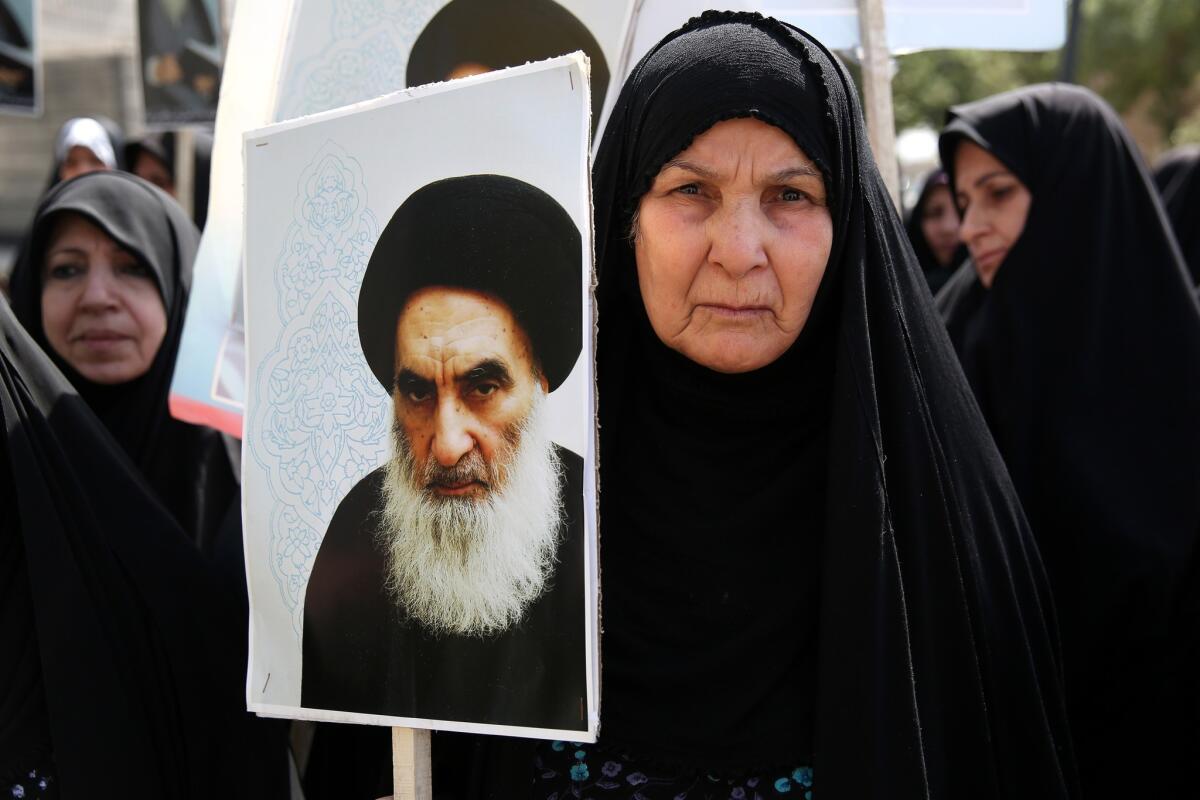Leading Iraqi cleric demands consensus on a premier as fighting rages

- Share via
Reporting from Baghdad — Iraq’s most influential cleric demanded Friday that squabbling lawmakers agree on a prime ministerial candidate before parliament convenes next week as a fierce battle continued at a strategically located university north of Baghdad.
The call by Shiite Muslim cleric Ayatollah Ali Sistani in his weekly sermon came as Iraqi security forces appeared to be regaining ground in their effort to turn back an Al Qaeda splinter group that has taken over much of the country in an offensive this month.
Sistani, whose remarks were delivered by a spokesman in the holy city of Najaf, said Iraqi political parties should decide on candidates for prime minister, president and parliament speaker before lawmakers meet for the first time on Tuesday. Two-term Prime Minister Nouri Maliki, a Shiite, is fighting to hold on to power as Sunni Muslim insurgents try to topple his government, and many rival lawmakers demand that he step aside.
“We demand that the parliament members have an agreement on the three positions before” they meet, Sistani said through the spokesman.
The 83-year-old cleric’s call would be difficult to meet because Maliki has resisted efforts to deny him a third term. But some members of his Shiite Dawa party are said to be considering backing another candidate as opposition to his administration grows in Iraq as well as around the world.
Sistani’s remarks carry weight not only because he’s the most revered religious figure for Iraq’s majority Shiite population, but because he is usually cautious in his political statements.
A call by Sistani two weeks ago for able-bodied Iraqis to volunteer to help Iraqi security forces beat back the Islamic State of Iraq and Syria insurgents resulted in hundreds of thousands of men reportedly turning up at recruitment centers across the country. Many of the volunteers have been dispatched to defend Shiite shrines that the insurgents have pledged to destroy, as well as to strategic sites around Baghdad, where Iraqi forces appear to be gathering some momentum.
A second day of clashes occurred Friday at Tikrit University, about 100 miles north of Baghdad, as Iraqi soldiers fought to hold the campus ahead of what appeared to be an assault on the city.
A day earlier, according to Iraqi news reports, army helicopters airlifted soldiers to a stadium inside the university grounds in a dramatic operation that drew anti-aircraft fire from insurgents. One helicopter was reportedly hit, but there was no immediate word on casualties.
Tikrit, best known as Saddam Hussein’s hometown, is a majority Sunni city that militants seized two weeks ago. The university is located on the main highway connecting Baiji -- site of Iraq’s largest oil refinery, which militants and Iraqi forces have battled over for a week -- and Samarra, home to a sacred Shiite mosque whose destruction by Al Qaeda militants in 2006 set off Iraq’s sectarian civil war.
New York-based Human Rights Watch said Friday that it had seen strong evidence that ISIS carried out mass killings after taking control of Tikrit on June 11. Analyzing photos and satellite imagery, the independent watchdog group said it believed that ISIS killed between 160 and 190 men in at least two locations in the city, but that the actual number of victims could be much higher.
Earlier, ISIS had boasted of executing as many as 1,700 Shiite soldiers in Tikrit and published photographs of men in civilian clothes lying in ditches. Human Rights Watch said its analysis strongly suggests that mass killings took place at the sites featured in the ISIS photos, but that it wasn’t possible to ascertain the number of victims without visiting the area.
“The photos and satellite images from Tikrit provide strong evidence of a horrible war crime that needs further investigation,” said Peter Bouckaert, the group’s emergencies director.
Special correspondent Hussein Kadhim contributed to this report.
For more news from Iraq, follow @SBengali on Twitter
More to Read
Sign up for Essential California
The most important California stories and recommendations in your inbox every morning.
You may occasionally receive promotional content from the Los Angeles Times.














